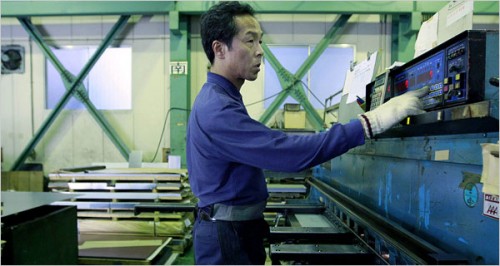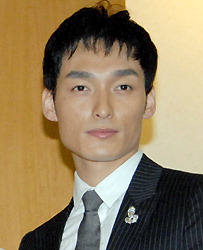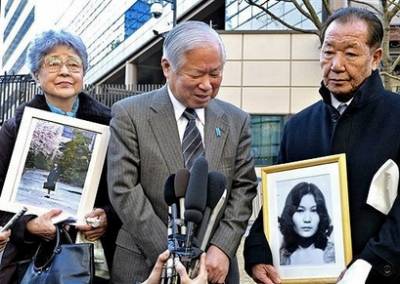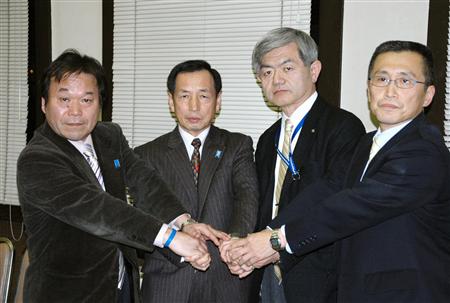(Updated below)
I don’t remember when, but at some point I became subscribed to this guy’s mail magazine “Glimpses of Japan.” I can’t remember and can’t find the full name of the author (maybe he’ll come forward!) but his name is Mike, from a picture I saw once he looks like he’s in his late 40s, and he works at NEC Learning which is a provider of what appears to be classroom technology. He’s been in the country for what seems like forever and has an interesting sort of grizzled veteran’s take on developments here, though this seems to be written with an ESL audience in mind.
More often than not, he’s griping about the traffic in Tokyo, but this week’s post was so spot-on I want to share it with you in full. Enjoy:
Media Malady
2009.5.22
*****—————————————————————–*****
Once again I’m bemused by the pathetic state of the mass media here, particularly the TV news. The phrase “media circus” is often used to describe the antics of (especially) broadcast media when they get into frenzied over-reporting mode, but I don’t think that’s appropriate for the Japanese media’s latest hysterical outpouring of pseudo-news: if it were a circus it would at least be entertaining.
It’s bad enough that the Japanese government has decided to regard the “Novel Influenza A (H1N1)”, previously called the “swine flu”, as if it were much more serious than the rather mild, easily treatable influenza virus infection that it is. The media have been treating the “outbreak” as if it were the Black Death.
Breathless, serious-looking reporters stand in front of hospitals saying, in worried tones, things like, “this is the hospital where the 16-year-old high school student flu patient is staying”. I understand that TV news is a visual medium, and that they want to be able to show something, but a guy standing in front of a building just isn’t newsworthy, particularly when they are avoiding giving the names of the patients and the hospitals, for privacy reasons. It’s just not *news*, and serves only to make people more anxious about something barely worth worrying about.
With companies and local governments over-reacting by closing down schools, postponing events, and canceling business trips, an aura of panicked fear is being encouraged and expanded by the media’s relentless and largely content-free approach to reporting what little actual news there is. Huge signs on news sets show the number of people who have contracted the flu nationwide (not very many, actually, as a percentage of population, roughly comparable to the number of traffic accident *deaths* in Tokyo in a year), many of whom are already nearly recovered.
It can’t be making people feel more confident to see that, even with the science-fiction-like biohazard suited crews going aboard aircraft before passengers disembark, the flu still managed to spread, either.
There’s also more than a little xenophobia involved in the reporting, and in people’s responses to the influenza news.
I understand that there have been clueless, panicked, ignorant people asking local governments whether it’s safe to hang laundry out to dry and whether their pets are in danger. In the true spirit of TANSTAAFL, I also understand that many of the high school and junior high school kids who have been prevented from attending school in order to stop the spread of the flu…are taking advantage of the time off to gather in Karaoke rooms. That’s bound to be counter-productive.
Speaking of counter-productive, having the prime minister appear on TV in a kind of public service announcement, looking worried as he tells people not to be anxious and not to over-react or to believe spurious rumors…*that’s* a great way to cause people to worry *more*, not less.
I have a large capacity for being amused at the bizarre and the stunningly ridiculous, but the current exaggerated media handling of what should be a very minor issue
exceeds my ability to laugh.
I was, it’s true, cynically amused by a friend’s suggestion that the whole government/media pseudo-news frenzy/circus is a conspiracy to take the Japanese public’s mind off the terrible economic conditions and the administration’s inability to deal with them. I don’t seriously think that’s the case, but it would at least be more logical than what the truth seems to be.
Glimpses of Japan vol.240
On the surface, the overall media reaction to what could have been a serious outbreak seems fact-based and rational (with notable exceptions!). They followed every government move and reported on the infections. And basically the government did what it should have – maybe there was an over-emphasis on masks and they were a little slow to switch tactics when the virus turned out to be relatively harmless. But I have to agree with Mike and Takashi Uesugi who argue that the media completely freaked out over the swine flu. The breathlessness, the dead-serious tone, and the constant “breaking news” of every miniscule detail of the story all have combine to create an fearful atmosphere that’s truly numbing when you realize how comparatively non-threatening this flu virus really is.
That’s what leads people to believe they all need to wear masks to prevent infection, which did in fact cause well-publicized runs on the masks and opportunistic online auctioners. As Durf noted on Twitter, “The media set out to increase media importance to viewers, as usual; breathless reporting on panic-worthy stuff is the way to go!” This was the media trying to make themselves seem important through play-by-play reporting on whatever the scandal of the moment happens to be. A recent example of a how this behavior can get a little overblown was the flap over whether the kanji test guys made too much money from their massively popular product.
I don’t think the media all sat down and decided to incite panic. In fact, maintaining the status quo and helping to keep public order seems to be one of their missions that they take seriously. What’s more likely is every media outlet decided to take this threat very seriously and follow this potentially age-defining story closely, as they always do for the scandal/story de jour. Just in the case of a flu outbreak, the sum of their actions proved incredibly neurosis-inducing. As usual, whenever someone tells you “stay calm” or “don’t panic” that’s usually exactly what makes you start to panic!
On that last line about a government conspiracy to crowd the headlines with flu stories – I personally think there is something to it. The government (meaning the Aso administration, not the health officials) doesn’t have to have orchestrated the entire media response to fuel it to their advantage. And not everyone in the government is necessarily on the same page. Looking at health minister Masuzoe’s press conferences, for example, I get the impression that rather than cheaply exploit the scandal by burying other stories and panicking the public, he seeks to project an air of competence and cool-headedness (Aso’s “nobody panic” TV commercials, on the other hand, are a different story). And from a health standpoint the actions taken don’t seem too insane. I mean, the health checks and monitoring were necessary, and they didn’t do anything drastic like shut down Osaka just to help Aso’s opinion polls.
But it seemed like there was something in the public announcement that could have egged the media on. One especially dubious move was the government announcement that they specifically requested the mask companies to boost production – as if they needed to be told! Truly, it would be tragic and counterproductive if actual sick people couldn’t get their hands on masks because fearful healthy people bought them all.
What the government should be doing but isn’t doing enough of is actively calming people without screaming OK NOBODY PANIC. A good example was what Masuzoe did last week – he explained the facts about the flu without exaggeration or alarm and noted that the current status of the outbreak meant the government could tone down its response and stop in-flight inspections.
Interesting side note!!! On the asahi.com front page is this line advertising their swine flu special full coverage section: 予防にはまず手洗い “For prevention, first wash your hands”
Funny, what happened to listing masks first as the best line of defense just a week ago?! Well, since I posted my anti-mask rant (which itself attracted a decent readership in the Japanese blogosphere thanks to mozu which may inspire me to write some more in Japanese despite mozu’s warning of the “risk”) blogs and several major media outlets (Yomiuri print edition, Asahi (“don’t believe in masks too much”), and J-Cast so far as I can tell) have noted the CDC/WHO recommendations and the practices of other countries. Durf notes that at least one doctor on TV said to “ignore masks.” Unfortunately I don’t have time to document this in detail, but it is interesting to see how the message has evolved from GO GET A MASK NOW to some more rational consideration.
Most of the reaction came as a result of stories from places like the LA Times, so I think whatever impact I had was very small. But I think it was healthy that there was some signficant skepticism and pushback over the recommendations for EVERYONE to go out and get a supply of masks.
As the virus spreads to Tokyo, the call for MASKS MASKS MASKS will not end. The train operators are already campaigning for it in what seems more like a CYA maneuver than anything else. I mean these companies may be sued or publicly shamed if they don’t put forth a forthright and careful response. (Are you for preventing the flu or are you siding with the terrorists?) But at least we can remember to just consistently wash our hands and cough into our sleeves, we don’t need to succumb to this ill-informed misinformation.
Update: Somehow I missed this: the head of the health ministry’s flu response came out on May 21 to declare that it’s not necessary for people to wear masks “in outdoor areas where there is not much crowding.” And went on to explain, “Masks are intended to prevent infected people from spreading the virus. Please wear one if you have a cough.”





